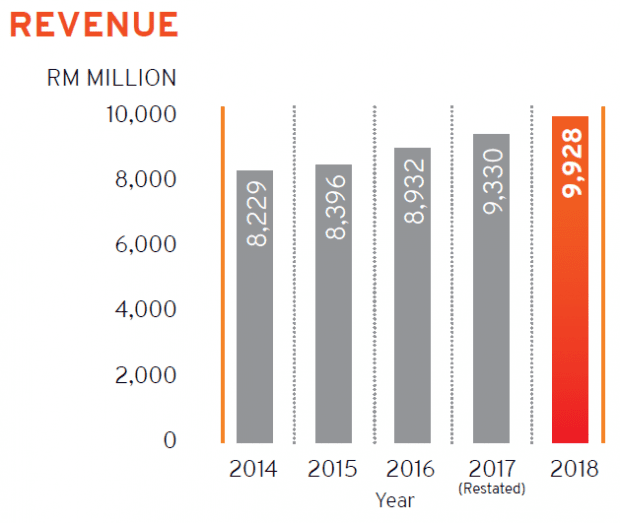
Listed in 1989, Genting Malaysia Berhad (GENM) is a household name in Malaysia. It owns Resorts World Genting, a hill resort located in Genting Highlands which is about an hour’s drive away from Kuala Lumpur. Resorts World Genting offers visitors a wide variety of dining, retail, and entertainment options, and a welcome respite from Malaysia’s tropical heat. But most importantly, it operates a casino. I recently visited the resort on a weekday and was surprised to find how crowded it was; it was flooded with tourists, both local and foreign.
2018 was a tough year for GENM as it was hit with RM1.8 billion in impairment losses on its promissory notes, higher annual casino license fees and duties, and a litigation battle with Walt Disney and Twenty-First Century Fox.
Here are 11 things I learned from the 2019 Genting Malaysia AGM:
1. Revenue grew 6.4% year-on-year to RM9.9 billion in 2018. The increase was driven mainly by operations in Malaysia where there was an improved hold percentage — the percentage of money held by a table game — in the mid to premium players segment as well as higher business volume from the mass market. The Skytropolis Funland indoor theme park as well as more dining and retail options were also rolled out to the public in 2018. The leisure and hospitality segment in Malaysia contributed to approximately two-thirds of GENM’s revenue in 2018.
2. GENM posted a net loss (including one-off items) of RM19.5 million in 2018 compared to earnings of RM1.2 billion the previous year. The decline in net profit is mainly due to the RM1.8 billion impairment loss on promissory notes issued by the Mashpee Wampanoag Tribe. The promissory notes were issued to finance the development of an integrated gaming resort in Taunton, Massachusetts, USA. In September 2018, the U.S. Federal Government concluded the tribe did not satisfy the Indian Reorganization Act to pursue with the integrated development. The impairment loss comprises RM1.1 billion in original construction costs and RM0.7 billion in unearned interest and fees. The project is currently pending further court developments and actions by relevant government authorities to reaffirm the land in trust for the benefit of the tribe. GENM has no plans to further invest in the project at this point.
3. The promissory notes carry fixed interest rates of 12% and 18% annually, which was deemed quite high and risky by one shareholder. The tribe did not manage to secure a loan from commercial banks and eventually turned to private financial backers like GENM. In Chairman Tan Sri Lim Kok Thay’s opinion, the interest rate did not fully reflect the risk of the project and thought GENM could have asked for higher interest rates in order to justify the risk.
4. Resorts World Genting has 10,500 rooms spread across seven hotels. Two-thirds of room nights were taken up by Malaysians with the rest going to international guests mainly from Singapore, Indonesia, Thailand, China, and India. Occupancy rate was 97% in 2018 compared to 95% in 2017. Average room rate was RM106 in 2018, a 15.2% y-o-y increase from RM92 the year before. The resort drew 25.9 million visitors in total in 2018 — an increase from 23.6 million in 2017 — out of which 73% of visitors were day-trippers.
5. Revenue contribution from the leisure and hospitality segment in the UK and Egypt fell by 6.0% y-o-y to RM1.8 billion in 2018 as the premium gaming segment recorded lower business volume. There were 4.1 million visits to the casino, a 6% decline from 2017. GENM may consider closing its underperforming casinos in the UK and Egypt. It is also worth noting that Resorts World New York City owns a 41% market share (by gaming revenue) in the Northeast U.S. region.
6. Effective 1 January 2019, the Ministry of Finance revised the annual casino licence fee from RM120 million to RM150 million per year and casino duties from 25% to 35%. The casino duty is especially harsh as it is taxed on GENM’s gross revenue. The changes may impact up to 30% of net profit in 2019.
7. Tan Sri Lim voluntarily reduced his salary by 20% in view of the challenging business environment. His initiative earned a round of applause from shareholders but some commented that he could consider reducing his salary by 50% instead! In the Corporate Governance Monitor 2019 published by Securities Commission Malaysia, Tan Sri Lim is both the highest and second-highest paid CEO in 2018, earning RM168.0 million and RM80.6 million from Genting Berhad and GENM respectively. To further mitigate the impact of the hike in casino duties, other cost cutting measures may be implemented including reducing promotional incentives and marketing expenses as well as reducing the number of employees to lower payroll and related costs.
8. GENM’s outdoor theme park has been closed since 2013 and was originally planned to reopen as a Fox World theme park in 2016. However, the opening of the new theme park was delayed several times and, in 2018 GENM sued Disney and Fox for more than US$1 billion for abandoning the contract to build the theme park. According to GENM, Disney pulled the plug as GENM’s gaming image did not fit Disney’s family-friendly branding. In July 2019, the dispute was resolved and Genting will be allowed to use certain Fox intellectual properties for the new theme park.
9. The same shareholder asked about GENM’s plan with the superyacht Equanimity, now renamed Tranquility. In April 2019,GENM purchased the superyacht at US$126 million — which is about half its original building cost of US$250 million –and another US$3 million was incurred to refurbish and upgrade the vessel. The yacht is on its way to Europe to be chartered for the remaining three months of the summer high season (which usually lasts five months). A yacht charter company estimated the Tranquility could yield US$1.5 million per week in charter fees. The yacht can also be catered for Asian high rollers like those in Macau. GENM would consider a sale for the vessel if an opportunity arises.
10. The same shareholder asked if the management planned to dispose Resorts World Kijal in Terengganu, Malaysia. The underperforming resort had an occupancy rate of 34% in 2018, a further drop from 41% the previous year. Tan Sri Lim explained that resort had been profitable before the State of Terengganu banned public drinking including at hotel bars. As a result, the move deterred foreign tourists which led to the low occupancy rate. The land will be kept for potential residential development in the future instead of being sold at a distressed price. GENM also has no intention to expand into Laos in response to a question by a shareholder. Tan Sri Lim also clarified that Genting Singapore is the party who will bid for licences to set up integrated resorts in Japan.
11. The Malaysian Shareholders Watchdog Group commented that it was not good practice to have the same person, Tan Sri Lim, to be appointed as chairman and CEO of GENM. However, GENM is of the view that Tan Sri Lim has sufficient experience to carry out the two roles. He also has 49.5% stake in GENM, which makes him aligned with shareholders’ interests. GENM also has seven independent directors which represents more than half the board, and believes that the board is independent and objective enough to discuss matters in the interest of GENM.
Liked our analysis of this AGM? Click here to view a complete list of AGMs we’ve attended »




